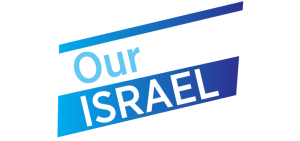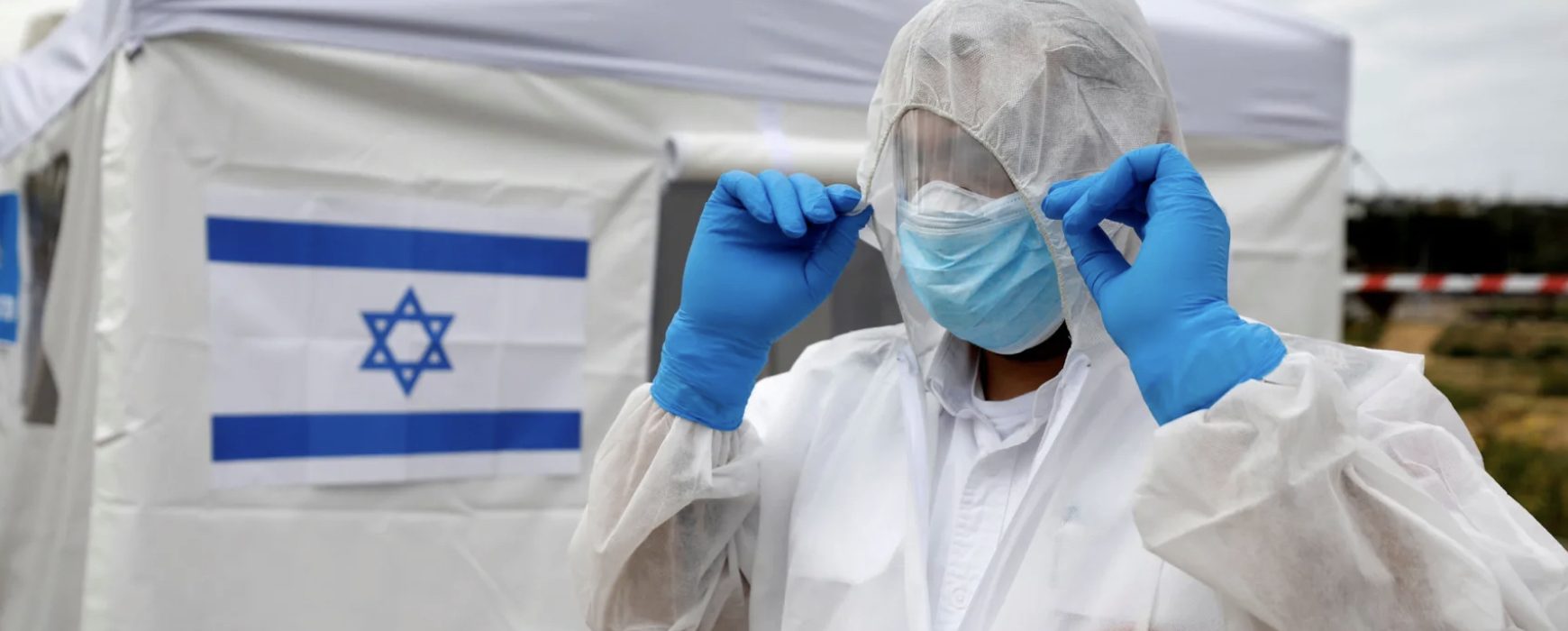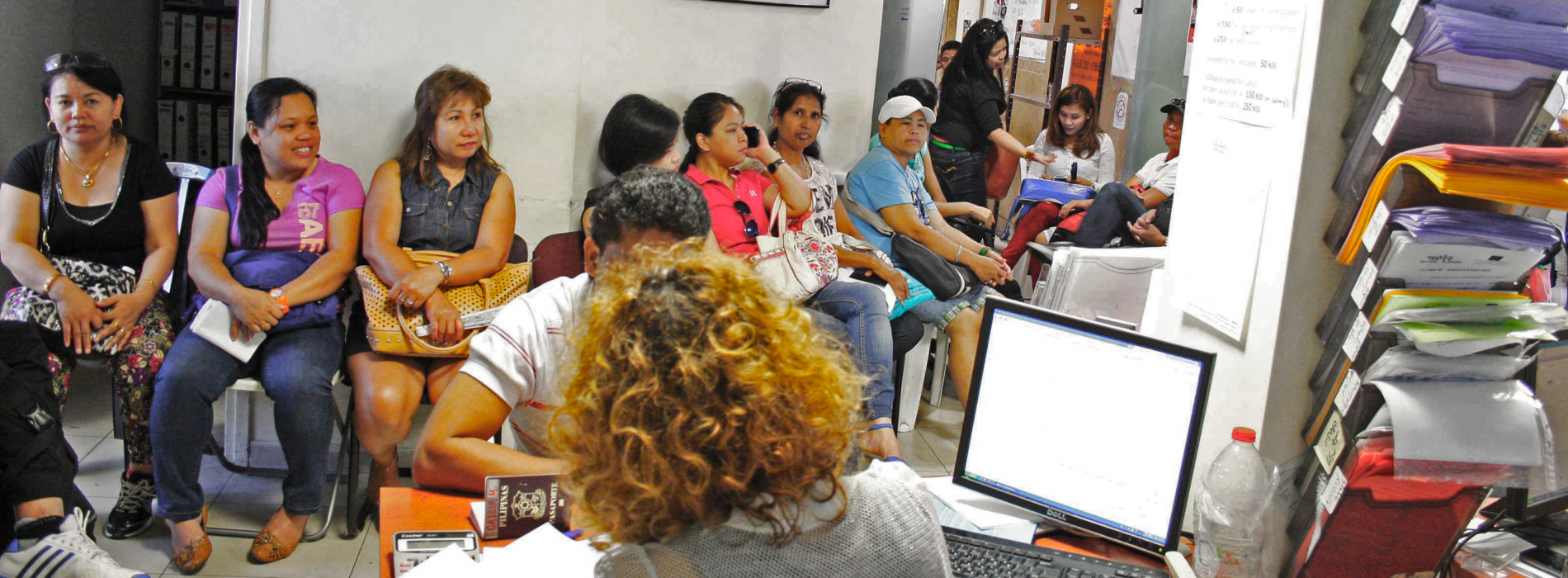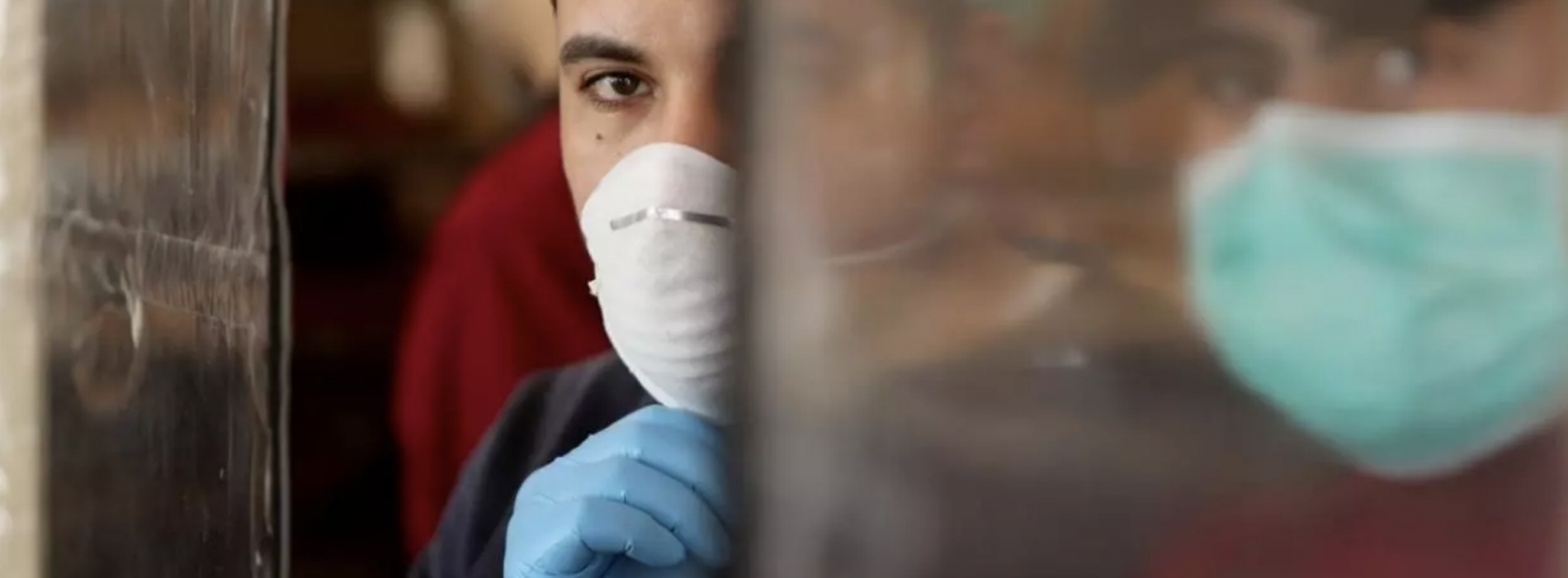- About Us
- Policy Center
- Learn
- Press Room
- Blog
- Get Involved
- Donate
- Donate to J Street Online
- Make a Gift in Someone’s Honor or Memory
- Make a Monthly Gift
- Tax-Deductible Donations
- Giving by mail

The COVID-19 pandemic poses a major threat to the health and safety of Israelis and Palestinians, as it does in so many other areas around the world. So far, 2,170 Israelis have tested positive for the virus, while 5 people have died. In the West Bank, 60 Palestinians have tested positive, with another two cases recently announced in Gaza.
Strict measures have now been put in place to limit the spread of the virus, with all schools closed, all public gatherings banned and Israelis limited to staying within a 100 meter radius of their homes. The nation’s chief rabbis have urged all synagogues to be closed, with prayer instead taking place inside people’s homes. Any semblance of normal life has been completely disrupted.
Beyond the immediate threat of the highly contagious virus and its impact on Israel’s health system, the crisis is of course — like in the US and every other country touched by the virus — exacerbating other serious challenges in many different corners of society, especially among the most vulnerable communities. For Israeli civil society organizations, issues of inequality and social justice are more urgent than ever, even as the groups themselves face difficult questions about how to continue their work and raise funds.
In this special installment of J Street’s ‘Our Israel’ project, we take a look at the inspiring Israeli civil society groups who are stepping up to meet the moment.

Earlier this month, the Israeli worker’s rights group Kav LaOved, an organization recently profiled by J Street, was welcoming hundreds of low-paid workers to their offices for face-to-face advice on underpayment, visa issues and their workplace rights. Today, following 600,000 layoffs in Israel due to coronavirus, demand for their assistance is higher than ever.
“Hourly workers are being laid off, refugees and asylum seekers are losing positions in the restaurant and hospitality sector and Palestinian workers employed in Israel are restricted and cannot enter for work,” wrote Executive Director Adi Maoz in a memo to supporters. “The most vulnerable workers are without safety nets and little protection of their rights.”
The crisis couldn’t have hit at a worse time, with the Ministry of Labor having just cut funding for the organization’s worker support hotline — the very service which is now in highest demand. With face-to-face reception hours suspended due to social distancing, much of their casework is now done over the phone or online. Dozens of volunteers who used to show up at their offices now assist remotely.
Behind the scenes, the group is lobbying the government for increased sick-leave provisions, visa adjustments for migrant workers and assistance for refugees, asylum seekers and Palestinian day-laborers who’ve been hard-hit by the economic shutdown. “Civil society organizations like Kav LaOved will, more than ever, be the main source of support for marginalized workers and at the forefront in supporting them during this critical time of need,” said Maoz.

While other offices are closing down, Physicians for Human Rights are determined to keep their community clinic’s doors open. “The continuation of the clinic’s work is a result of the efforts of our dedicated team of volunteers, who insist on continuing to provide care despite the challenges,” the group said in a statement.
The group has been particularly focused on refugees and asylum seeker communities in Israel, translating and circulating information in Eritrean. “Their communities, who are in ordinary times subjected to discrimination, exclusion and neglect, lack the capacity and resources to practice isolation or receive supportive care and now face a heightened infection risk,” the group said.
The medical advocacy group has been strongly advocating for equality of care across social, economic and ethnic groups. “History has taught us that outbreak containment strategies affect people in different socio-economic strata differently, with the poor, migrants, the elderly and other disempowered groups paying a heavier price,” Physicians for Human Rights said. “Viruses and disease make no distinction between people. They do not ask to see a person’s status or ID card and generally remind us that we are all equal.”
As Israelis increasingly turn their attention to the Ministry of Health for urgent health advisories and lockdown updates, Adalah — a legal center for Arab and minority rights — noticed a glaring omission: Some updates were only published in Hebrew, sidelining Arab-Israelis who make up more than 20% of Israel’s population.
“Inequality in access to information can harm all citizens,” Attorney Aiah Haj Odeh said, stressing the need for a population-wide response. “The coronavirus does not discriminate according to the ethnic identity of its victims, and the Israeli Health Ministry must therefore provide equal services for all citizens.” While the government has now begun issuing Arabic updates, the group says they have been limited and subject to delays. Adalah is continuing to advocate for real-time, multilingual updates.
The group has also been lobbying the government to provide coronavirus health services to Bedouin villages in the Naqab desert. Recently, in partnership with the Association for Civil Rights in Israel, the Adalah won a temporary injunction from the High Court banning the Israeli government from using cell phone data to trace Coronavirus patients without Knesset approval.
At the Israel Women’s Network, COVID-19 has forced a refocus on two primary issues: Domestic violence and women’s labor rights. “In China the cases of family violence doubled during the Corona crisis,” IWN Development Director Yael Shamir told J Street. The network, the subject of a J Street profile in January, is now seeing a similar spike in calls to women’s shelters as Israelis retreat to their homes. “We have called for the establishment of a national situation room,” Shamir said, as the organization seeks a coordinated response to the increased risk to women as public spaces shut down.
At the network’s legal department, the legal aid hotline has been ringing off the hook. “We’re advising women about their rights in the workplace in this crisis situation where so many women, and men, are fired or sent on unpaid leave,” Shamir said. “One good piece of advice about a woman’s labor rights and how to exercise them can make a big difference to an entire family.”
For Shamir, who works in fundraising, the economic downturn poses a secondary challenge with donors tightening their belts. “This lovely spring was to be our fundraising opportunity for 2021,” she told J Street, describing the outlook as now potentially grim. “We’re working hard, and hope to come out of this in decent shape.”

At Gisha, an Israeli human rights group focused on freedom of trade and movement for Gaza residents, their offices are also empty — though their work is as urgent as ever. “We were deeply troubled to hear of the first coronavirus cases in Gaza,” Gisha’s Director of International Relations, Beth Oppenheim, told J Street this week. “The ailing health sector in Gaza is ill-prepared to manage a health crisis of this magnitude.”
Residents of the territory, under blockade from Israel and Egypt, already struggle with undrinkable tap water, intermittent electricity and astronomic levels of unemployment. The threat of coronavirus, which has now been confirmed among several residents, is particularly grave in the densely populated war-torn territory.
In advance of an expected outbreak, Gisha, previously profiled by J Street, is putting renewed pressure on the Israeli government to keep commercial crossings open and to remove trade restrictions. The Israeli group is also directing focus to the Israeli government’s obligations under international law.
“Israel’s comprehensive, ongoing control over substantial aspects of daily life in Gaza comes with a responsibility to protect the fundamental rights and living conditions of its residents, even in challenging times such as the present,” Oppenheim said.
For pro-equality advocacy groups like Standing Together, whose theory of change relies on grass-roots organizing and protest, rules on social-distancing have proven particularly challenging. The response has been to turn to digital tools, with Standing Together organizing a digital conference last week with speakers including Joint Arab List MK Ahmed Tibi, former Meretz chair Tamar Zandberg and Rabbis for Human Rights Executive Director Avi Dabush.
Another allied group organized a balcony protest, with Israelis banging on pots and pans from their homes to demonstrate against the adjournment of parliament by the Netanyahu-allied speaker Yuli Edelstein. Darkenu, a moderate advocacy group, organized an online “Fighting for Our Home, from Home” protest which attracted more than half a million viewers on Facebook.
For Standing Together, a group previously profiled by J Street, the crisis has increased the urgency of many of the issues they have long campaigned on — access to healthcare, economic justice, unemployment assistance and easing the Gaza blockade.
Want to learn more about how pro-Israel, pro-peace Americans can stand with Israeli civil society groups, and to receive the latest analysis of how the COVID-19 crisis is impacting Israelis and Palestinians?